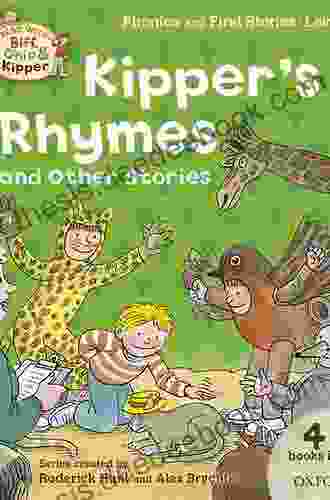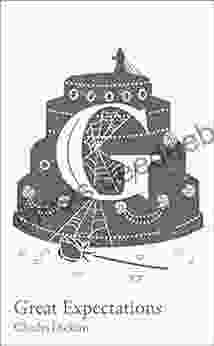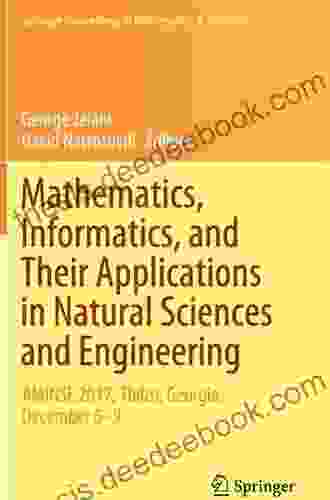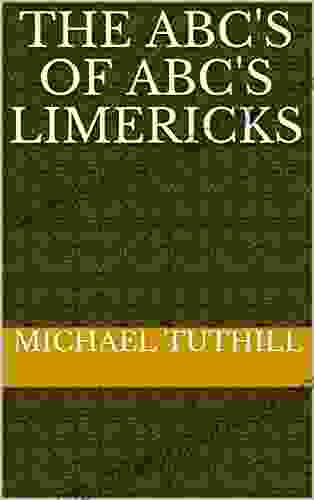Mathematics, Informatics, and Their Applications in Natural Sciences: A Comprehensive Overview

Mathematics and informatics are two closely related fields that play a vital role in the natural sciences. Mathematics provides the theoretical foundation for understanding the world around us, while informatics provides the tools for collecting, processing, and analyzing data. Together, these fields have revolutionized the way we study and understand the natural world.
Mathematics in the Natural Sciences
Mathematics is essential for understanding the fundamental laws of nature. It provides a language for describing physical phenomena and a framework for developing theories. For example, Isaac Newton's laws of motion are expressed in mathematical equations, and Albert Einstein's theory of relativity is based on a complex mathematical framework.
4.7 out of 5
| Language | : | English |
| File size | : | 5697 KB |
| Screen Reader | : | Supported |
| Print length | : | 187 pages |
Mathematics is also used to solve problems in the natural sciences. For example, differential equations are used to model the motion of planets and stars, and statistical methods are used to analyze data from experiments. Mathematics can also be used to develop computer simulations, which can be used to study complex systems such as the climate or the human body.
Informatics in the Natural Sciences
Informatics is the science of information. It deals with the collection, storage, processing, and analysis of data. Informatics has become increasingly important in the natural sciences as the amount of data available has exploded.
Informatics tools can be used to:
- Collect data from sensors and other devices
- Store and manage large datasets
- Process data to extract meaningful information
- Analyze data to identify patterns and trends
- Visualize data to make it easier to understand
Informatics tools are used in a wide variety of natural science disciplines, including:
- Astronomy: Astronomers use informatics tools to collect and analyze data from telescopes and satellites. This data is used to study the stars, planets, and galaxies.
- Biology: Biologists use informatics tools to collect and analyze data from DNA sequencing and other experiments. This data is used to study the structure and function of living organisms.
- Chemistry: Chemists use informatics tools to collect and analyze data from experiments. This data is used to study the properties of chemicals and how they interact with each other.
- Earth science: Earth scientists use informatics tools to collect and analyze data from sensors and satellites. This data is used to study the Earth's atmosphere, oceans, and landforms.
- Physics: Physicists use informatics tools to collect and analyze data from experiments. This data is used to study the fundamental laws of nature.
Applications of Mathematics and Informatics in the Natural Sciences
Mathematics and informatics have a wide range of applications in the natural sciences. Some of the most important applications include:
- Modeling natural phenomena: Mathematics can be used to develop models of natural phenomena, such as the motion of planets or the flow of fluids. These models can be used to predict the behavior of these phenomena and to design experiments to test theories.
- Data analysis: Informatics tools can be used to analyze large datasets and identify patterns and trends. This information can be used to make informed decisions and to develop new theories.
- Simulation: Computer simulations can be used to study complex systems such as the climate or the human body. These simulations can be used to predict the behavior of these systems and to design experiments to test theories.
- Visualization: Informatics tools can be used to visualize data in ways that make it easier to understand. This can help scientists to identify patterns and trends and to communicate their findings to others.
Mathematics and informatics are essential tools for understanding the natural world. These fields provide the theoretical foundation for understanding the laws of nature and the tools for collecting, processing, and analyzing data. Together, these fields have revolutionized the way we study and understand the natural world.
Mathematics and informatics are two powerful tools that have revolutionized the way we study and understand the natural world. These fields provide the theoretical foundation for understanding the laws of nature and the tools for collecting, processing, and analyzing data. Together, these fields have made it possible to make significant advances in our understanding of the natural world and to develop new technologies that have improved our lives.
References
[1] David Acheson. Elementary Fluid Dynamics. Oxford University Press, 1990.
[2] Roger Penrose. The Road to Reality: A Complete Guide to the Laws of the Universe. Alfred A. Knopf, 2005.
[3] Ian Stewart. Concepts of Modern Mathematics. Dover Publications, 1995.
[4] Donald E. Knuth. The Art of Computer Programming, Volume 1: Fundamental Algorithms. Addison-Wesley, 1997.
[5] Thomas H. Cormen, Charles E. Leiserson, Ronald L. Rivest, and Clifford Stein. to Algorithms. MIT Press, 2009.
4.7 out of 5
| Language | : | English |
| File size | : | 5697 KB |
| Screen Reader | : | Supported |
| Print length | : | 187 pages |
Do you want to contribute by writing guest posts on this blog?
Please contact us and send us a resume of previous articles that you have written.
 Book
Book Chapter
Chapter Story
Story Genre
Genre Reader
Reader Paperback
Paperback E-book
E-book Magazine
Magazine Bookmark
Bookmark Shelf
Shelf Glossary
Glossary Bibliography
Bibliography Foreword
Foreword Synopsis
Synopsis Footnote
Footnote Codex
Codex Library card
Library card Narrative
Narrative Reference
Reference Encyclopedia
Encyclopedia Dictionary
Dictionary Narrator
Narrator Character
Character Resolution
Resolution Librarian
Librarian Catalog
Catalog Stacks
Stacks Archives
Archives Study
Study Scholarly
Scholarly Lending
Lending Academic
Academic Journals
Journals Special Collections
Special Collections Interlibrary
Interlibrary Literacy
Literacy Thesis
Thesis Reading List
Reading List Theory
Theory Textbooks
Textbooks 50 Cent
50 Cent Morr Meroz
Morr Meroz Marian L Tupy
Marian L Tupy Sherril Dodds
Sherril Dodds David Bromwich
David Bromwich Sarah P Lockhart
Sarah P Lockhart Colin Alexander
Colin Alexander Bradley Schroeder
Bradley Schroeder History Titans
History Titans Micky O Brady
Micky O Brady Cassie Gustafson
Cassie Gustafson Casi Mclean
Casi Mclean Roderick Hunt
Roderick Hunt Monique Mcdonell
Monique Mcdonell Susan Johnson
Susan Johnson Keith Stein
Keith Stein Teresa Maria O Hara
Teresa Maria O Hara L J Hatton
L J Hatton Martin Stewart
Martin Stewart Mark Sinclair
Mark Sinclair
Light bulbAdvertise smarter! Our strategic ad space ensures maximum exposure. Reserve your spot today!

 Tyrone PowellKipper Rhymes And Other Stories: A Delightful Collection of Poems and Tales...
Tyrone PowellKipper Rhymes And Other Stories: A Delightful Collection of Poems and Tales...
 Marc FosterThe Person-Centered Approach to Therapeutic Change: A Comprehensive Guide for...
Marc FosterThe Person-Centered Approach to Therapeutic Change: A Comprehensive Guide for... Bernard PowellFollow ·11.1k
Bernard PowellFollow ·11.1k Jared PowellFollow ·7.8k
Jared PowellFollow ·7.8k Colin RichardsonFollow ·9.1k
Colin RichardsonFollow ·9.1k Salman RushdieFollow ·7.7k
Salman RushdieFollow ·7.7k Johnny TurnerFollow ·19.2k
Johnny TurnerFollow ·19.2k Colin FosterFollow ·7.8k
Colin FosterFollow ·7.8k Anton ChekhovFollow ·6.9k
Anton ChekhovFollow ·6.9k Kyle PowellFollow ·2.6k
Kyle PowellFollow ·2.6k

 Russell Mitchell
Russell MitchellGCSE Set Text Student Edition: Collins Classroom Classics...
The GCSE Set Text Student Edition: Collins...

 Ralph Turner
Ralph TurnerSix Sigma Lean Green Belt Training for Beginners with...
What is Six...

 Travis Foster
Travis Foster10 Life-Changing Lessons I Learned When I Was Single
Being single can...

 Jermaine Powell
Jermaine PowellOne Great Insight Is Worth a Thousand Good Ideas
In the competitive and...
4.7 out of 5
| Language | : | English |
| File size | : | 5697 KB |
| Screen Reader | : | Supported |
| Print length | : | 187 pages |












